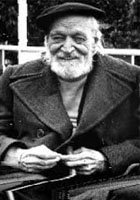Giuseppe Ungaretti
Giuseppe Ungaretti Poems
This mutilated tree gives
Me support, left in this pot-hole
It has the bitterness of a circus
Before or after the show.
...
Star, my only star,
in the poverty of the night, alone,
for me, alone, you shine,
in loneliness you shine;
...
That negligible bit of sand which slides
Without a sound and settles in the hourglass,
And the fleeting impressions on the fleshy-pink,
The perishable fleshy-pink, of a cloud…
...
That negligible bit of sand which slides
Without a sound and settles in the hourglass,
And the fleeting impressions on the fleshy-pink,
The perishable fleshy-pink, of a cloud…
...
What chant has taken off this night
that interwaves
of crystalline echo of the heart
the stars
...
Magic moon, you are so consumed
that, breaking the silence,
you put on the old ilexes of the rise,
a slippery veil.
...
They come back high to burn the tales.
They will fall with the leaves on the first wind.
But that another breath come,
new sparkling will come back.
...
Cease murdering the dead.
If you hope not to perish, if you
Want sound of them again,
Stop crying out, cease
...
Giuseppe Ungaretti Biography
Giuseppe Ungaretti was born in Alexandria, Egypt, in 1888, and lived in North Africa as a youth. He studied in Paris before serving in the Italian infantry during World War I. His poetry was influenced by the nomadic culture of North Africa, by the friendships he formed with the literary and avant-garde circles of Paris, and by his European war experiences. Ungaretti's early poetry, written in the trenches of WWI, dealt with love and the precariousness of life. Later, when influenced by the French symbolists, he inaugurated the Hermeticism movement in poetry. He pioneered the Modernist movement in Italian poetry and is widely regarded as one of the leading Italian poets of the twentieth century. His poetry is sparse and intense, contains elaborate rhetorical structures, and is renowned for its powerful insights and emotions. After World War II, Ungaretti's writing returned to the traditional meters of Italian poetry, and he wrote many erotic and religious poems. He also wrote essays and translated the works of Shakespeare, Racine, and others into Italian. Ungaretti taught at the University of São Paolo in Brazil between the two world wars, then accepted a literary chair at the University of Rome in 1942. He died in Italy in 1970. His works are collected in twelve volumes under the title Vita d’un uomo (Life of a Man). A good English translation of his poetry is Allen Mandelbaum’s Selected Poems, published in 1975.)
The Best Poem Of Giuseppe Ungaretti
Rivers
This mutilated tree gives
Me support, left in this pot-hole
It has the bitterness of a circus
Before or after the show.
I watch
The quiet passage of
Clouds over the moon.
This morning I stretched
Myself in an urn of water,
Like a relic, and rested.
The Isonzo scoured
Me like
One of its stones.
I pulled my four
limbs together,
And went, like an acrobat,
Over the water.
Crouched by my clothes
Fouled with war, I inclined
My head, like a Bedouin,
To receive the sun.
This is the Isonzo.
And it is there I
Most see myself
In the universe
A compliant
Thread.
My pain is
When I do not believe
Myself in harmony.
But those hidden
Hands give as they knead me
A rare joy.
I have relived
The stages of my life.
The Serchio: from
Which have drawn, perhaps
For two thousand years
My country people, my father,
My mother.
This is the Nile
That has seen me be born,
And grow
And burn in ignorance on
Extending plains.
This is the Seine; and I mingled
In that muddiness learning each
Part of all myself.
These are my rivers confluent
In the Isonzo.
This is my nostalgia
That in each
One shines through me, now
It is night, and my life seems
A budding
Off of shades.
Giuseppe Ungaretti Comments
this is another wonderful short (very short!) poem by Ungaretti: ''Mattina'' M’illumino d’immenso - in English: 'Morning' I illuminate (myself) with immensity . [written on Janury 1917, during World War 1 - it's about the desire of searching for a renovated harmony with the universe]

One of Ungaretti's most famous poems: Soldati (Soldiers) Si sta come d'autunno sugli alberi le foglie - It's like being in the autumn on the trees the leaves